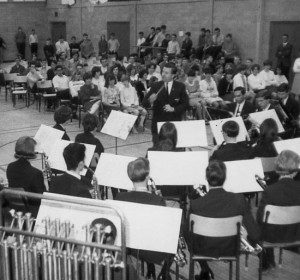
Most of the time I sat among the back seats in the rehearsal room. But that’s OK. As long as I kept one eye on the music charts in front of me and the other down front where conductor John Rutherford stood, I knew I’d stay in step with the rest of the group. I just had to wait for Mr. Rutherford’s downbeat and I was part of the performance. And that meant a lot to me. He’d often begin the rehearsal with the same words of encouragement.
“OK,” Rutherford would say. “Let’s make a little magic.”
And we’d be off to some exotic place or back to some bygone era. It didn’t really matter where or when we went, but even in the third or fourth trumpet section – way in the back of the rehearsal room – I knew I was part of the adventure. That was the value I felt from being part of my school band at Agincourt Collegiate (just outside Toronto).
We rarely won awards. On the grand scale of things, we were hardly noticed as a musical force. But just participating cannot fully be measured by grades, board economics, or even a child’s total education. A school band delivered so much more than that.
I read, with much sadness this week, the latest survey of 1,000 elementary schools in this province. The People For Education (PFE) report shows that fewer than 41 per cent of Ontario grade schools have a full-time or part-time music teacher on their staff.
And the number continues to decline. In 2007, a decade ago, about 48 per cent of those same schools had a music teacher. In 1998, it was 58 per cent. That means there are fewer John Rutherfords in the lives of students than there could or should be.
What’s worse, I think, is that board of education budget cuts have affected other areas of arts instruction too. Despite the generally acknowledged axiom among the Ontario Ministry of Education’s policy-makers, that arts play an important role in the creativity, academic achievement, leadership and problem-solving skills of pupils in school, the arts are the poor sister to sciences, math and athletics. The PFE report shows that only 15 per cent of Ontario Grade 7 and Grade 8 students have a visual arts teacher, and only eight per cent have a drama teacher.
Why does that matter? Well, for example, a student can study the Napoleonic Wars in a history class, but she can understand the impact of the Russian repulse of Napoleon’s armies better by playing Tchaikovsky’s “1812 Overture.” Or, the story of global sport might come from social studies class, but only in Antonio Carlos Jobim’s chorus of “The Girl from Ipanema” can students feel the cultural rhythm that drove Brazil’s highly successful Olympic Games last summer. And recreating that history on a band instrument sure beats reading it on a blackboard or even a computer screen. Playing the overture or the bossa nova delivers a history lesson, a geography lesson and dash of linguistics too.
As a follow up to the PFE report, the Toronto Star reached an educator from Eastern Ontario. Jim Palmer told the Star, that without music classes, students lose “an organized opportunity.”
In other words, for children who might otherwise feel disconnected, music programs, especially where kids play on instruments or sing in choral groups, give young people a reason to socialize, collaborate and perform with others.
I know that helped our two daughters at Joseph Gould Public School (then a senior public school in Uxbridge, Ont.) Both girls joined the J.G. Jazz Band back in the 1990s and thanks to their extraordinary music teacher/band leader Jenny Kanis, the girls learned to harmonize, co-operate and support their peers every time the band performed or competed across the country. And music has benefited both daughters since, one as an elementary school teacher, the other as a professional jazz singer.
“(It’s) a key to 21st century skills,” music teacher Palmer told the Star.
When I went back into my columns, I discovered I’d written on this subject four years ago. At that time, I quoted another education advocate, Annie Kidder. And her rationale for supporting music programs in elementary schools went even further.
“When you talk to people in business now,” she told Canadian Press, “they feel that capacity to think creatively, to innovate, is a core part of being an entrepreneur – being able to lead a change in a knowledge economy.” In other words, Kidder says music gives kids 21st vocational century skills.
I wholehearted agree. Anybody who can read music charts, pick up tempo, translate that to a motor skill and make the results come to a musical conclusion, must have an arithmetic capacity. And that can’t hurt when it comes to deductive reasoning or motivational capacity either. Good musicians can certainly make successful business leaders.
Whatever other tangible things music delivers, as a young person, I will never forget how maestro John Rutherford and his music teachings gave me a sense of self-esteem and adventure that no other instruction could deliver.
Great article, Ted…
Coincidentally, a former student of Jim Palmer’s (a teacher at Athens District High School near Brockville) commented this week on Facebook that the years in Mr. Palmer’s band and classes were life-changing for her. I so wish we had more music teachers like him in our schools.